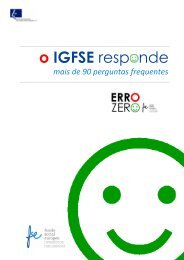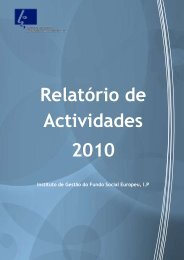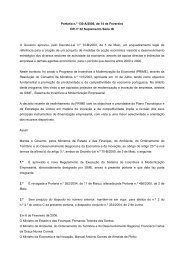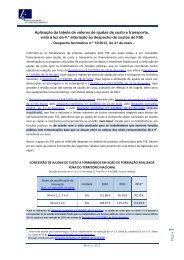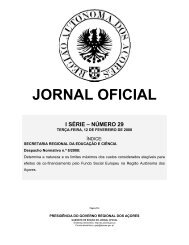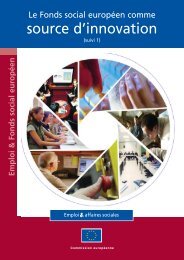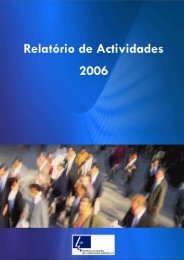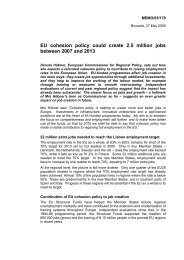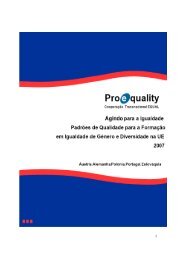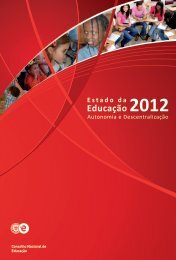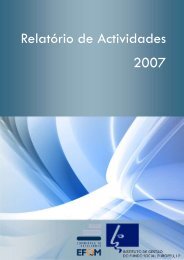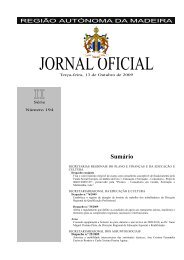Industrial Relations in Europe 2012 - European Commission - Europa
Industrial Relations in Europe 2012 - European Commission - Europa
Industrial Relations in Europe 2012 - European Commission - Europa
Create successful ePaper yourself
Turn your PDF publications into a flip-book with our unique Google optimized e-Paper software.
the <strong>Commission</strong> not to present it to the Council, on the grounds of subsidiarity and proportionality.<br />
At the same time, the Party of <strong>Europe</strong>an Socialists, several Members of the <strong>Europe</strong>an Parliament<br />
and many <strong>Europe</strong>an trade union confederations, <strong>in</strong>clud<strong>in</strong>g the ETUC, criticised the <strong>in</strong>itiative of<br />
these Member States and asked the <strong>Commission</strong> to cont<strong>in</strong>ue the procedure as foreseen <strong>in</strong> the Treaty.<br />
The current debate around the hairdressers' agreement po<strong>in</strong>ts to the need to improve and clarify the<br />
criteria to be used by the <strong>Commission</strong> <strong>in</strong> the assessment of social partners' agreements that are<br />
submitted to the <strong>Commission</strong> for implementation by means of a legislative <strong>in</strong>strument. Such criteria<br />
were def<strong>in</strong>ed most recently <strong>in</strong> a communication of 2002 100 . S<strong>in</strong>ce then new practices and methods<br />
of preparation of legislative proposals have been <strong>in</strong>troduced <strong>in</strong> l<strong>in</strong>e with the pr<strong>in</strong>ciples of the Smart<br />
Regulation agenda. These <strong>in</strong>volve <strong>in</strong>ter alia the preparation of extensive ex ante impact assessments<br />
def<strong>in</strong><strong>in</strong>g the problem, sett<strong>in</strong>g the objective clearly and compar<strong>in</strong>g costs and benefits across a range<br />
of different policy options. The <strong>Commission</strong> has <strong>in</strong>dicated that it would look at the ways <strong>in</strong> which,<br />
without underm<strong>in</strong><strong>in</strong>g the autonomy of the social partners, the impact of future agreements should be<br />
evaluated, thereby enabl<strong>in</strong>g the <strong>Commission</strong> and the Council to make an <strong>in</strong>formed decision. For its<br />
part, and <strong>in</strong> respect of the agreements that were submitted <strong>in</strong> <strong>2012</strong>, the <strong>Commission</strong> will analyse<br />
their impact, <strong>in</strong>clud<strong>in</strong>g their benefits and costs, on the basis of all facts and figures available. The<br />
results of the assessments of the agreements <strong>in</strong> the hairdress<strong>in</strong>g and <strong>in</strong>land waterway transport<br />
sectors should be available dur<strong>in</strong>g the course of 2013.<br />
Sea fisheries<br />
With the objective of ensur<strong>in</strong>g that fishers have decent conditions of work on board fish<strong>in</strong>g vessels,<br />
<strong>in</strong> 2007 the International Labour Conference of the International Labour Organization (ILO)<br />
adopted the Work <strong>in</strong> Fish<strong>in</strong>g Convention (C188). Its provisions address m<strong>in</strong>imum requirements for<br />
work on board, conditions of service, accommodation and food, occupational safety and health<br />
protection, medical care, and social security. The ILO Convention has been adopted by all 27<br />
Member States of the <strong>Europe</strong>an Union.<br />
In order to ratify the Convention, both national and EU regulations need to be adopted. With regard<br />
to EU law, the <strong>Commission</strong> <strong>in</strong>itiated a legislative process through the consultation of the social<br />
partners <strong>in</strong> 2007. Follow<strong>in</strong>g a period of negotiations, the EU social partners act<strong>in</strong>g <strong>in</strong> the sea<br />
fisheries social dialogue committee, ETF (represent<strong>in</strong>g workers) and Europêche and Cogeca (the<br />
employers’ representatives) signed an agreement on 21 May <strong>2012</strong> implement<strong>in</strong>g the ILO Work <strong>in</strong><br />
Fish<strong>in</strong>g Convention. By conclud<strong>in</strong>g this agreement, the <strong>Europe</strong>an social partners contribute to the<br />
systematisation of the social acquis communautaire <strong>in</strong> the fish<strong>in</strong>g sector, with the aim of<br />
encourag<strong>in</strong>g Member States to ratify the Convention and complete a <strong>Europe</strong>an and global level<br />
play<strong>in</strong>g field on the matter. The EU social partners have expressed the <strong>in</strong>tention to ask for the<br />
<strong>Commission</strong> to present to the Council their agreement <strong>in</strong> order to implement it via a Council<br />
decision <strong>in</strong> accordance with article 155(2) TFEU. To this end, they sent to the <strong>Commission</strong> an<br />
official letter, by which they expressed their <strong>in</strong>tention to revise their so-called autonomous<br />
agreement signed on 21 May <strong>2012</strong>, so that it fully complies with the exist<strong>in</strong>g EU law and acquis<br />
100 COM (2002) 341 of 26 June 2002. "The <strong>Europe</strong>an social dialogue, a force for <strong>in</strong>novation and change"<br />
266



